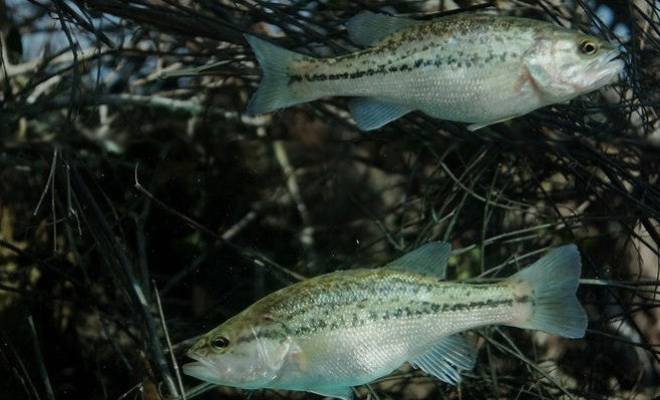In an effort to change up the regular blog post topics, we proudly present some staff-favorite recipes below! While we can all agree that catching the fish is the best part of owning a pond or lake, we think cooking up that catch is just as fun. Enjoy!
Catfish Bake
1-2 fresh catfish fillets
Cajun seasoning to taste
1 bag baby spinach
6 cherry tomatoes, sliced in half
1 TBSP capers
½ lemon, juiced
Zest of half a lemon
Pat dry the fillets and set in tin foil. Season both sides with cajun seasoning. Place spinach, tomatoes, and capers evenly around fillets. Top with lemon zest and juice. Wrap all up in the foil and bake at 400 for 20-30 minutes or until fillets are cooked through.
Brian Henneke
Lemon Butter Baked Bass
2 pounds bass fillets (roughly 4-6 fillets)
1 TBSP olive oil
Salt and pepper to taste
2 cloves garlic, minced
2 TBSP fresh lemon juice
Zest of ½ lemon
5 TBSP unsalted butter, melted
⅓ cup coarse fresh breadcrumbs
1 TBSP herb of choice (parsley, tarragon, rosemary)
4 slices or wedges of lemon for serving
Lightly pat fish dry. Grease a shallow baking dish with some butter and place fillets in an even layer. Rub with olive oil and season with salt and pepper. Let rest for about 30 minutes. Combine garlic, lemon juice, zest, and butter in a small bowl. Stir well. Pour the butter mixture over the fish and sprinkle with breadcrumbs. Bake at 350 for 15-25 minutes or until the fish is cooked through and the topping is golden. Let stand 5 minutes before serving. Garnish with herb and lemon slices.
Jordan Moore
Bacon Fried Bass
1 pound Hybrid Striped Bass fillets
2 TBSP bacon grease
1 tsp cayenne pepper
1 tsp chili powder
1 tsp paprika
Pinch of sea salt
Melt bacon grease in a pan on the stove and allow to sit for 2 minutes so it reaches a high temp. Place fillets in grease–as many as you can fit and still flip in the pan. Sprinkle spices on top of each fillet. When sides of fish turn white, flip. Flip every 30 seconds until fillets begin to flake. Remove from heat. Repeat with remaining fillets and additional bacon grease as needed. Divide and serve once completed.
Jean Wick
Blackened Crappie Fish Tacos
1 pound Crappie fillets
2 tsp smoked paprika
1 tsp chili powder
1 tsp ground cumin
1 tsp garlic powder
1 tsp onion powder
1 tsp kosher salt
½ tsp cayenne pepper
2 TBSP peanut oil
1-10 taco-sized corn tortillas, warmed
8 lime wedges
2 unpeeled Granny Smith apples, cored and cut into matchstick-size pieces
3 cups ice water with 2 TBSP lemon or lime juice
3 cups cabbage, finely shredded
1 carrot, grated
½ cup finely chopped red onion
⅓ cup mayonnaise
⅓ cup honey
1 TBSP lime juice
Start by making up the slaw. Place cut apples into ice water and add lime or lemon juice to prevent browning. Shred the cabbage and place into a large bowl. Add carrot, onion, mayo, honey, and lime juice. Stir well. Remove apple sticks from water bath and gently blot dry. Add apples to the slaw and stir gently to incorporate. Refrigerate the slaw for at least an hour or up to 48 hours before making the tacos. Mix paprika, chili powder, cumin, garlic powder, onion powder, salt, and cayenne in a small bowl. Pat fillets dry and season both sides of the fish with the spice blend. Heat a skillet over high heat. Add the peanut oil and sear fish 1-2 minutes per side or until just cooked through. Build your taco with the fillet and slaw and squeeze lime juice on top.
Johnny DeFriend
Catfish Étouffée
2 pounds Hybrid Catfish, chopped into big pieces
¾ cup peanut oil
¾ cup all-purpose flour
2 large bell peppers
2 medium onions
6 stalks of celery with leaves
5 large garlic cloves
2 tsp Old Bay seasoning
1 small jalapeno pepper
1 tsp ground black pepper
2 tsp cajun seasoning
2 bay leaves
1 tsp granulated sugar
1 tsp dried thyme
3.5 cups broth
Half a can crushed tomatoes
5 dashes Worcestershire sauce
Salt to taste
Chop bell peppers, onions, and celery into half-inch pieces and set aside. Mince the garlic and jalapeno together and put in separate bowl. In a heavy bottomed pot, combine ¾ cup peanut oil and ¾ cup of flour over medium heat. Stir constantly with a wooden spoon or whisk to create a golden roux. Add the bell peppers, onion, and celery to the pot and cook until they are softened. Add garlic and jalapeno. Mix in all dry spices aside from bay leaves. Mix in half a can of crushed tomatoes. Add the broth, Worcestershire sauce, and bay leaves to the pot and bring to a boil. Cover with lid and reduce to simmer, for 1 hour. Stir occasionally. Add catfish pieces to the pot and continue cooking until fish is cooked through. Serve over rice and garnish with parsley.
Edward Kallus
